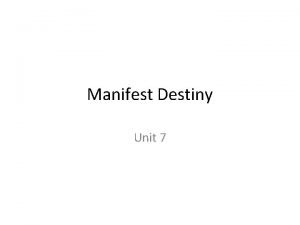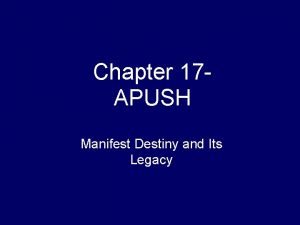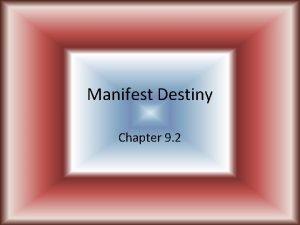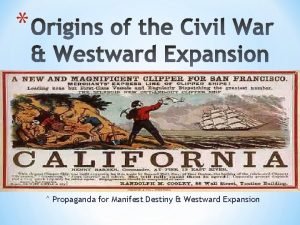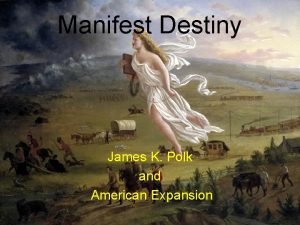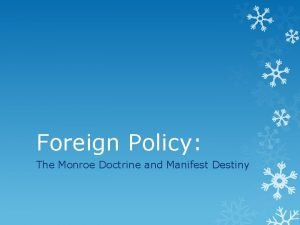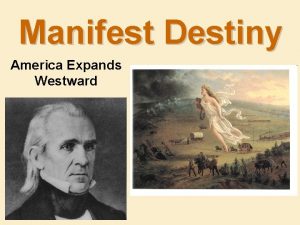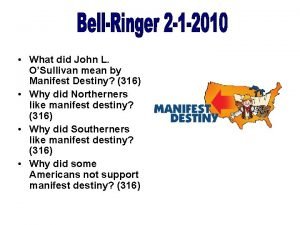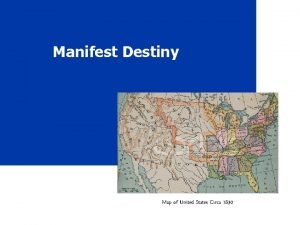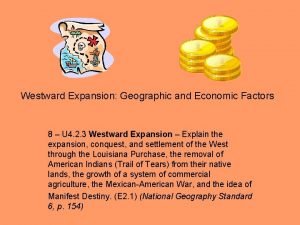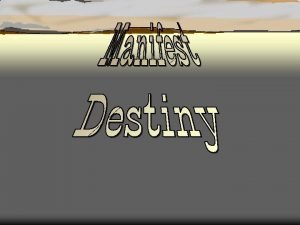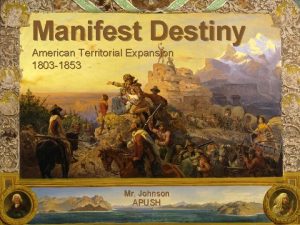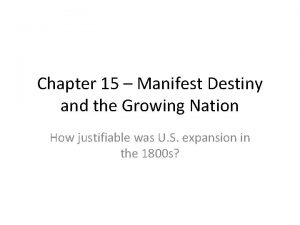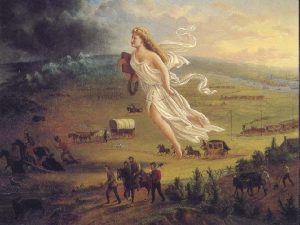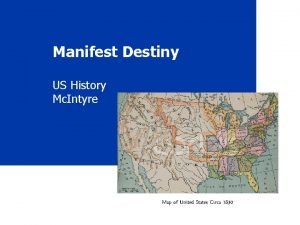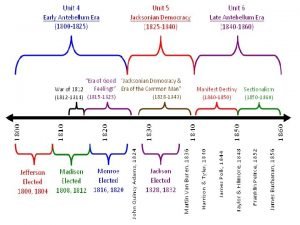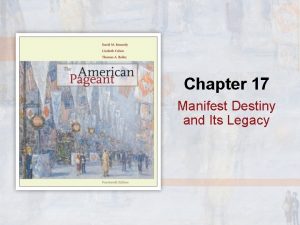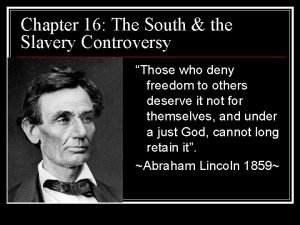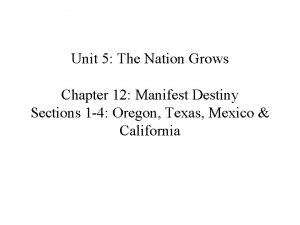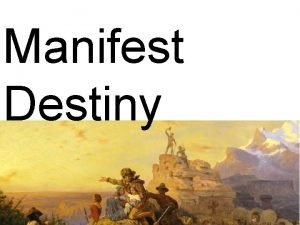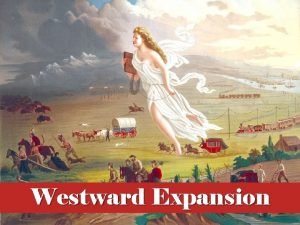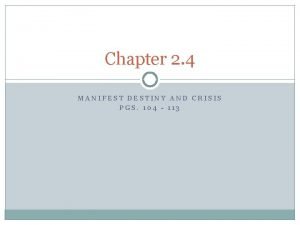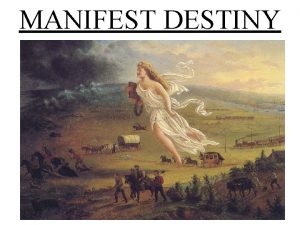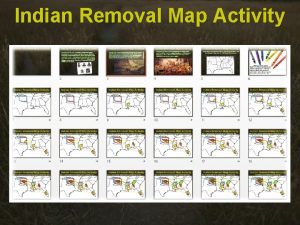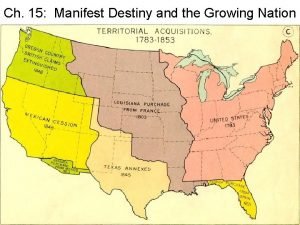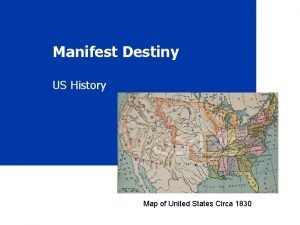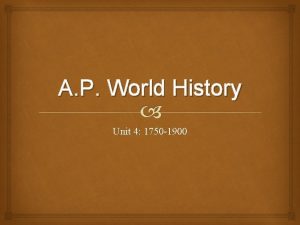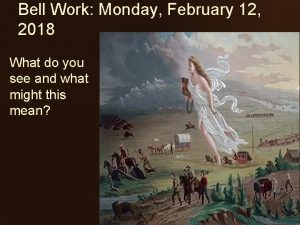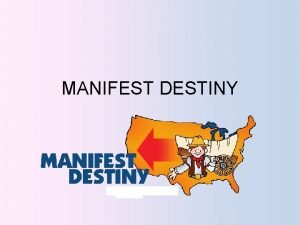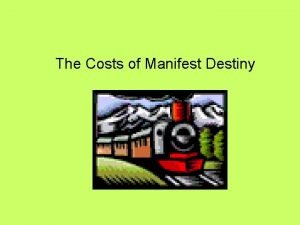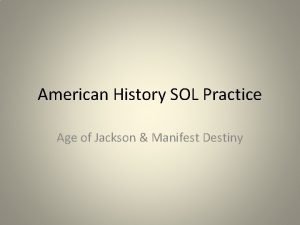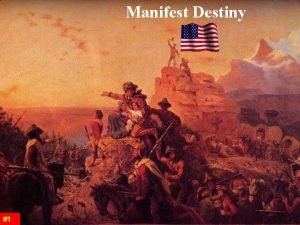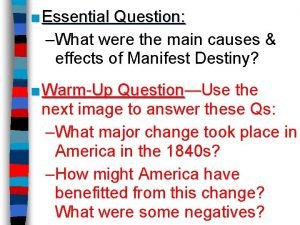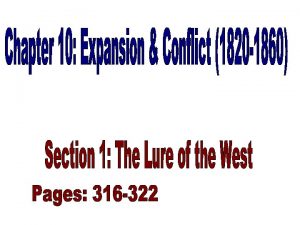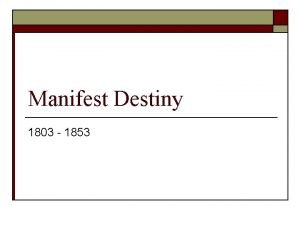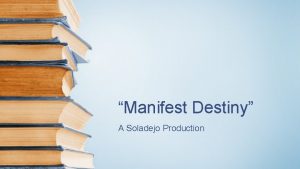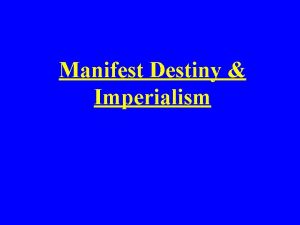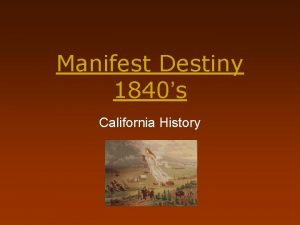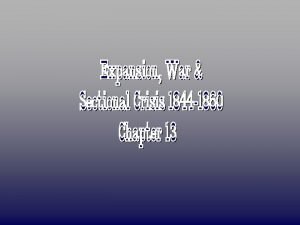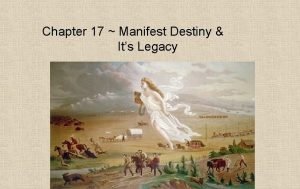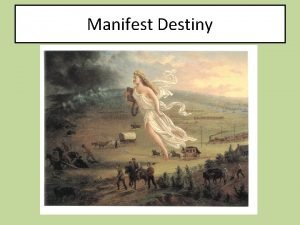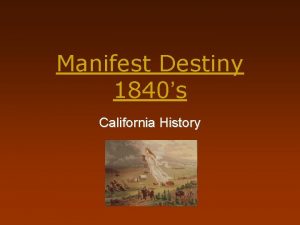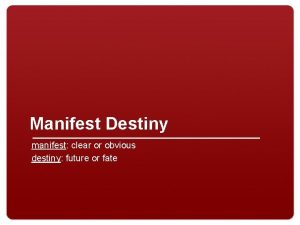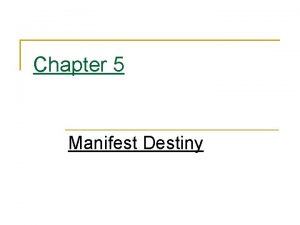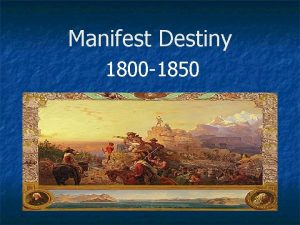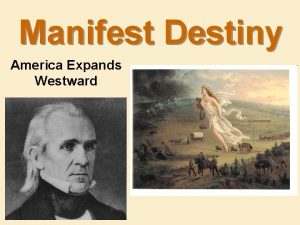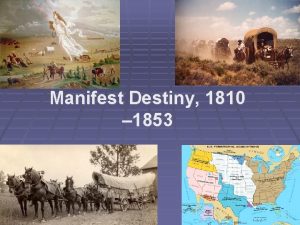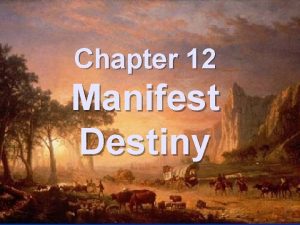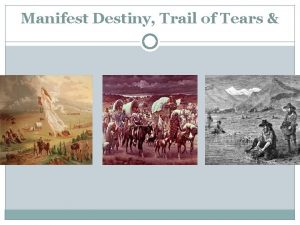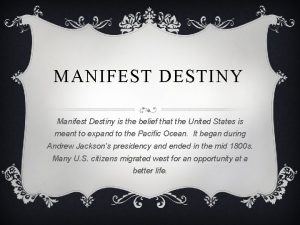From Manifest Destiny to Imperialism Provenance origins 1845






































- Slides: 38

From Manifest Destiny to Imperialism

Provenance (origins) 1845 magazine editor John L. O’Sullivan coins term “Manifest Destiny” n Introduced to public Relationship between Providence and American belief system

American Philosophy (cause) ". . the right of our manifest destiny to over spread and to possess the whole of the continent which Providence has given us for the development of the great experiment of liberty and federaltive development of self-government entrusted to us. It is right such as that of the tree to the space of air and the earth suitable for the full expansion of its principle and destiny of growth. " - John L. O’Sullivan

Effect Spanish? Native Americans? Anglo-Saxons? Americans? East Coast, West Coast? Other nations?

Age of Imperialism Late 1800’s European nations enlarging their empires around the world. n Political control, and economic benefits Many in US believe that in order to stay competitive, the US needs to do the same


President Benjamin Harrison 23 rd president of US, 1889 -1893 Republican First International Conference of American States in Washington, D. C. , October 1889 to April 1890 to discuss relations between (Latin) American countries Pro commercial expansion in US and regulated trusts

Why did America join the imperialist club at the end of the 19 th century?

1. Commercial Interests US foreign investments 1869 -1908

2. Military Interests

3. Social Darwinist Thinking The Hierarchy of Race The White Man’s Burden

4. Religious/Missionary Interests American Missionaries in China, 1905

5. Closing of the American Frontier


America Becoming a World Power Japan had not traded with a Western power for 250 years, but had great coal deposits. Means what? Commodore Matthew Perry sailed to Tokyo and “opened” or negotiated trade, July 8, 1853. Idea of Open Door Policy initiated. 1867 – U. S. seized the uninhabited Midway Islands in the Pacific (strategic for trade with China & Japan) 1867 – U. S. buys Alaska from Russia By 1872, gold, copper, and oil are discovered in Alaska. 1898 – Hawaii annexed by the US 1902 – US purchases Panama Canal

Open Door Policy - 1899 Secretary of State John Hay No hassle in the “sphere of influence or interest” Political and Economic motives Other Motivations? Germany, United Kingdom, United States, France, Italy, Japan, and Russian have claims to Chinese trade


Links with Japan Tension between US and Japan over islands in the Pacific Ocean 1894 US-Japan treaty to protect Japanese immigrants into the US- violated by S. F. Board of Edu. Gentleman’s Agreement = Board of Ed. Pressured to change by US & Japan limits Japanese immigrants Tension remains and increases

Boxer Rebellion Play History. com video Desire to spread Western culture into the Far East caused… The results? ? ? 8 modern military powers unite to resolve rebellion China = no guns imported & $330 million reparations to foreign nations 1912 Republic of China formed

US Foreign Policy w/ Far East United States’ industrial surplus Need foreign markets and expansion of trade partners Far East prime target due to modernizing

US and Japan trade Japanese wants to modernize military US wants to exports raw goods Japan exports silk & wool to US US exports oil, pigiron, scrap metal to Japan Effect: Japanese & US economies grow

Origins of the Spanish-American War Cuba had struggled for 30 years over independence from Spain. 1895 – Cuban rebels launched a fight for independence. Spanish retaliated by placing them in concentration camps. 1896 – Mc. Kinley elected President; openly supports Cuban independence.



Origins of the Spanish-American War Many Americans sympathetic to Cuba, seeing their revolution like ours. This creates tension with Spain. Warship U. S. S. Maine sent to Havana to protect Americans in Cuba February 15, 1898 U. S. S. Maine explodes Many Americans blame Spain, but we still don’t know for sure what happened

The War April 11, 1898 – Congress declares Cuba’s independence April 24, 1898 – Spain declares war on US April 25, 1898 – US declares war on Spain Fighting in Cuba and the Philippines (a Spanish territory) US wins in about four months Teddy Roosevelt becomes famous for fighting bravely in Cuba leading his troop called the “Rough Riders”


“Remember the Maine, and to Hell with Spain!” Funeral for Main victims in Havana

End of the War After the U. S. wins, Spain signs an armistice (cease-fire). In October, both countries signed the Paris Peace Treaty n n Spain granted Independence to Cuba. Guam, Puerto Rico and the Philippines to the U. S. for $20 million. Philippines part of US until 1946 Puerto Rico and Guam are still U. S. territories.

Annexation of Hawaii, 1900 • Sugar trade significance • overthrow of the monarchy of Queen Liliuokalani • US business influence (i. e. Sanford Dole) • immigration for labor • annexation by Mc. Kinley’s joint resolution • statehood, 1959

War and Annexation of Philippines 1899 -1902 Treaty of Paris transfers sovereignty from Spain to the USA Filipino troops control entire archipelago, except Manila a few brief years of guerilla fighting between troops Filipino rebels continue to fight after war ends

American Sphere of Influence Expanding

Impact of Yellow Journalism Defined: journalism based on exaggeration and crude sensationalism “Hogan’s Alley” cartoon drawn by Richard F. Outcault in 1895 -> created Yellow Kid increased sales of newspaper New York World Journalists began to sensationalize world news stories to boost sales, esp. Cuba Created fear in America public -> leads to Span. -Am. War

Lesson of Yellow Journalism The press can do two things in America especially: capture a wide audience’s attention and influence public reaction to world-wide events Relate to today’s “Fake News”

Teller Amendment Early April 1898 Sen. Henry M. Teller (CO) proposes amendment to Spanish-Am. War declaration proclaims the following about the U. S. . n n n 1) would not establish permanent control over Cuba 2) would disclaim any disposition of intention to exercise sovereignty, jurisdiction, or control over Cuba except for pacification 3) asserts its determination to leave the govt. and control of Cuba to its people Senate passed amendment on April 19, 1898 US keeps their word and occupies Cuba until 1902

Platt Amendment Succeeds the Teller Amendment introduced by Senator Orville Platt (R-Connecticut) in February 1901 Allows the United States "the right to intervene for the preservation of Cuban independence, the maintenance of a government adequate for the protection of life, property, and individual liberty. . . " Limits Cuba to transfer land only to U. S. Abrogated (ended) on May 29, 1934 as part of the Good Neighbor Policy under Roosevelt

The Outcome U. S. is now a major player in world affairs U. S. can create military bases around the world Imperialists happy: U. S. can gain access to foreign markets. Places to sell American goods and make money. Anti-Imperialists upset. Felt that imperialism rejected the American ideal of “liberty for all”

 Manifest destiny effect
Manifest destiny effect Tejanos apush definition
Tejanos apush definition What is the main idea of manifest destiny?
What is the main idea of manifest destiny? California gold rush advertisement
California gold rush advertisement Rio grande river
Rio grande river Monroe doctrine and manifest destiny
Monroe doctrine and manifest destiny Define manifest destiny in your own words.
Define manifest destiny in your own words. John l osullivan
John l osullivan United states map 1830
United states map 1830 Reasons for manifest destiny
Reasons for manifest destiny Manifest destiny newspaper
Manifest destiny newspaper Us territorial acquisitions 1803-1853
Us territorial acquisitions 1803-1853 Whats the definition of manifest destiny
Whats the definition of manifest destiny Travel in a growing nation answer key
Travel in a growing nation answer key Manifest destiny book
Manifest destiny book Manifest destiny map
Manifest destiny map Manifest destiny texas
Manifest destiny texas Chapter 17 manifest destiny and its legacy
Chapter 17 manifest destiny and its legacy Manifest destiny
Manifest destiny Chapter 12 manifest destiny
Chapter 12 manifest destiny What is manifest destin
What is manifest destin How did the hudson river school increase westward expansion
How did the hudson river school increase westward expansion John o sullivan manifest destiny
John o sullivan manifest destiny Manifest destiny
Manifest destiny Manifest destiny
Manifest destiny Indian removal act map
Indian removal act map Facts about manifest destiny
Facts about manifest destiny Map of manifest destiny
Map of manifest destiny Manifest destiny
Manifest destiny Ethnic enclaves ap world history
Ethnic enclaves ap world history How does this painting represent manifest destiny?
How does this painting represent manifest destiny? Gadsden purchase jimmy fallon
Gadsden purchase jimmy fallon John o'sullivan
John o'sullivan Destiny poem
Destiny poem Costs of manifest destiny
Costs of manifest destiny Manifest destiny who is the lady
Manifest destiny who is the lady Compromise enables maine and missouri
Compromise enables maine and missouri American progress book
American progress book Reason for manifest destiny
Reason for manifest destiny
